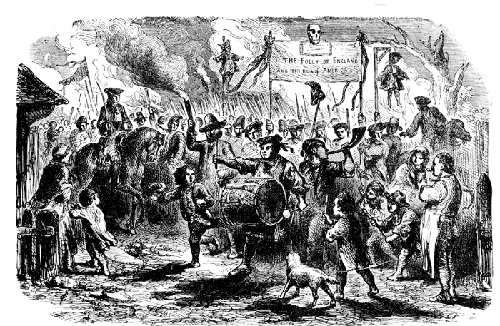In 1760, twenty-two-year-old monarch George III ascended the throne of England. The French and Indian War (Seven Year War) that had stretched on for years and encircled the globe finally ended in 1763, with the signing of the Treaty of Paris by France, Great Britain and Spain.
France lost all claims to Canada and gave Louisiana to Spain, while Britain received Spanish Florida, Upper Canada, and various French holdings overseas. The treaty ensured the colonial and maritime supremacy of Britain and strengthened the 13 American colonies by removing their European rivals to the north and the south.
Colonists were proud of their role in defeating the French, but England was faced with a vast territory to safeguard and a soaring debt.
In 1764, George Grenville, First Lord of the Treasury, proposed to strengthen Britain’s hold on its American investment. Addressing the King in his declaration of intent, Grenville argued that,
“Whereas it is expedient that new provisions and regulations should be established for improving the revenue of this Kingdom, and for extending and securing the navigation and commerce between Great Britain and your Majesty’s dominions in America, which, by the peace, have been so happily enlarged and:
“whereas it is just and necessary, that a revenue be raised, in your Majesty’s said dominions in America, for defraying the expences of defending, protecting, and securing the same.”
“We your Majesty’s most dutiful and loyal subjects, the commons of Great Britain, in parliament assembled, being desirous to make some provision in this present session of parliament, towards the said revenue in America, have resolved to give and grant unto your Majesty the several rates and duties herein after mentioned;”
“and do most humbly beseech your Majesty, that it may be enacted; and be it enacted …, That from and after the twenty ninth day of September, one thousand seven hundred and sixty four, there shall be raised, levied, collected, and paid, unto his Majesty …,”
“for and upon all white or clayed sugars of the produce or manufacture of any colony or plantation in America, not under the dominion of his Majesty …; for and upon indico, and coffee of foreign produce or manufacture; for and upon all wines (except French wine …)
The colonies have already been mired in a post-war depression.
In Boston, town meeting (the local government) carefully considered the Sugar Act (also called Plantation Act or Revenue Act). “We . . . declare our just expectations,” Bostonians announce, as they assert their rights and advise their representatives to the Massachusetts legislature to stand firm for traditional prerogatives.
Meanwhile, in New York, American patriots urge their countrymen to cast off British luxuries and set about producing their own raw materials and home manufactures. Such self-sufficiency, they insist, will empower colonists to dispel their dread and become the “richest People upon Earth.”
Effects of the Sugar Act
In order to enforce the collection of taxes violators were tried in admiralty courts where a judge decided the outcome rather than in colonial courts in where the decision was left to a jury. Admiralty courts were located in Halifax, Nova Scotia while colonial courts were local.
Admiralty judges were awarded 5% of the confiscated cargo as compensation which gave them the financial incentive to find the violator guilty and thus enforcing the law vigorously. This new system removed the traditional British protection to a fair trial.
In addition, the new law also affected the trade of certain commodities. Lumber and iron were added to the list of products that could be traded only with England. Duties were introduced to the importation of coffee, pimiento, wine from Madeira and the Azores and French and West Indian goods.
With few exceptions vessels going to the colonies had to pass through Britain, unload its cargo, pay duty on it, reload it and sail to the colonies. These measures increased the cost of doing business and undermined local industry. (Stamp-Act-History)
The Sugar Act and the American Revolution
Because of the strict enforcement the act did accomplish its goal of reducing smuggling which affected colonial economy, especially in Massachusetts, New York and Pennsylvania. The protests against the act were heavier in affected colonies and almost non-existent in unaffected ones. The law nevertheless promoted boycott of British luxury goods in some colonies and gave some boost to local manufacturing.
For the first time the Sugar Act raised different constitutional issues. While many perceived the Sugar Act as an infringement of their constitutional rights because they were, for the first time, taxed to raise revenue for the benefit of the crown, others viewed it as a tax to regulate the flow of trade and as a continuation of the existing and long accepted 1733 Molasses Act.
Those who perceived the law as unconstitutional thought that the law transformed a trade regulation into a revenue measure. Colonial residents had a fragmented view and it was not perceived in a uniformed way. The following year most colonial residents would agree that the proposed Stamp Act of 1765 violated their colonial rights of “No taxation without representation”. (Stamp-Act-History)
Click the following link to a general summary about the Sugar Act:

Leave your comment here: